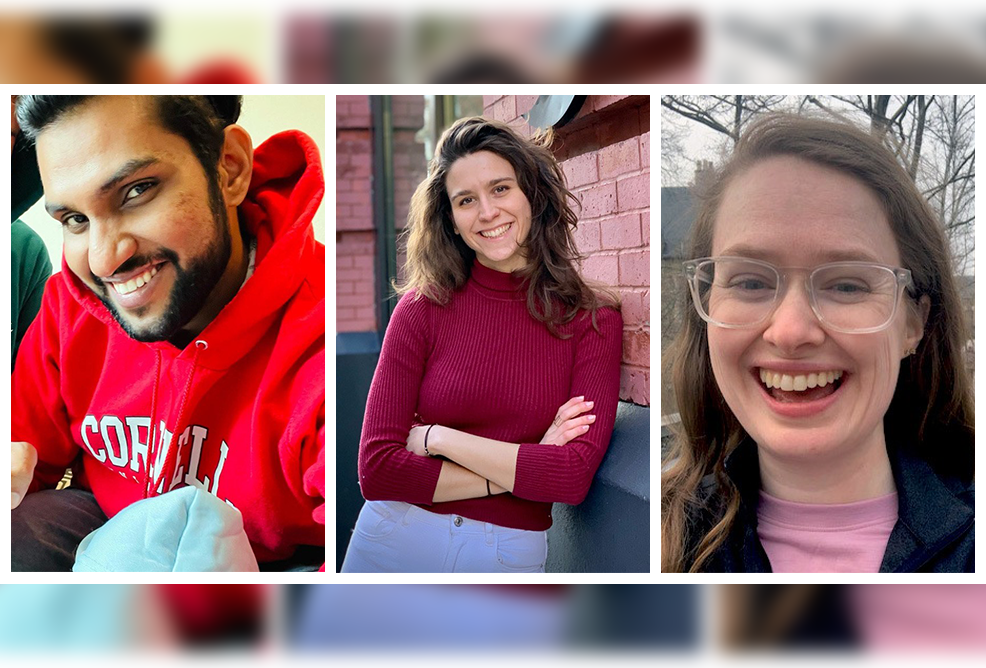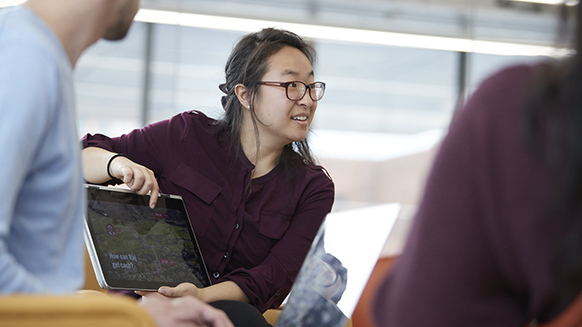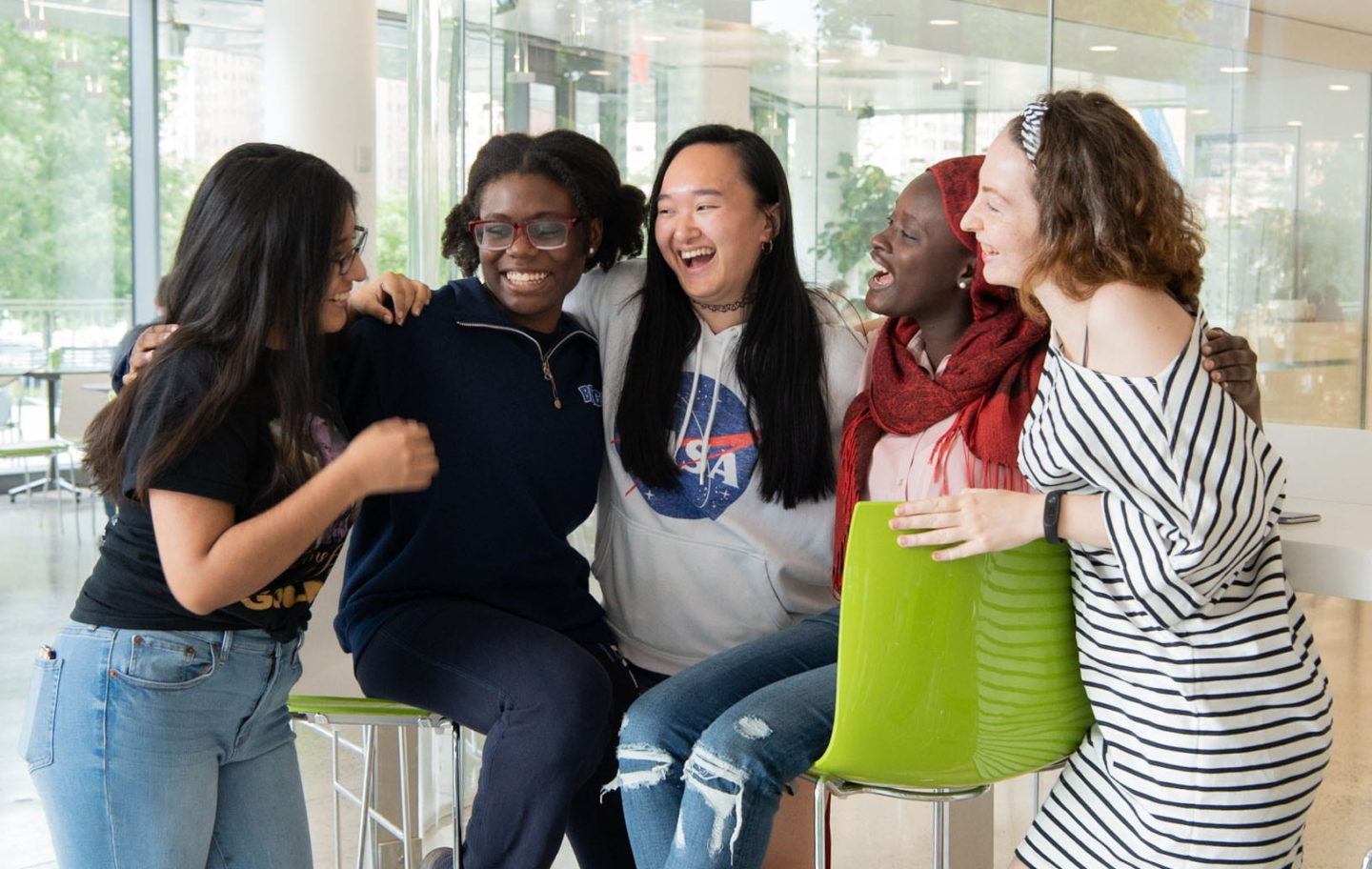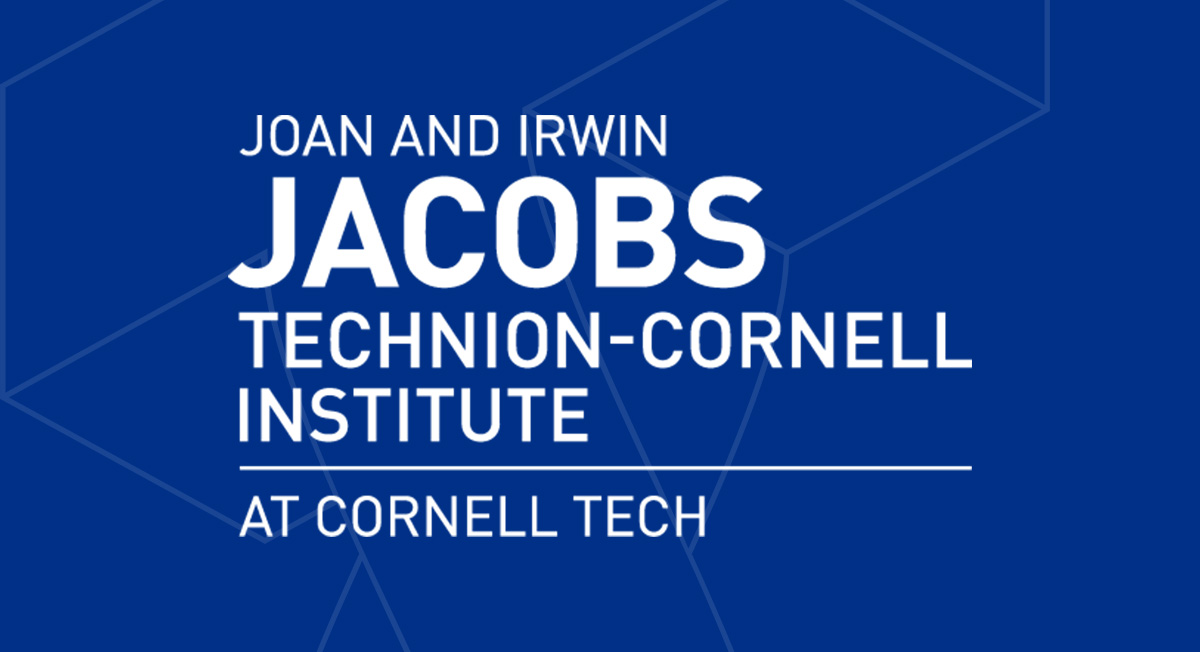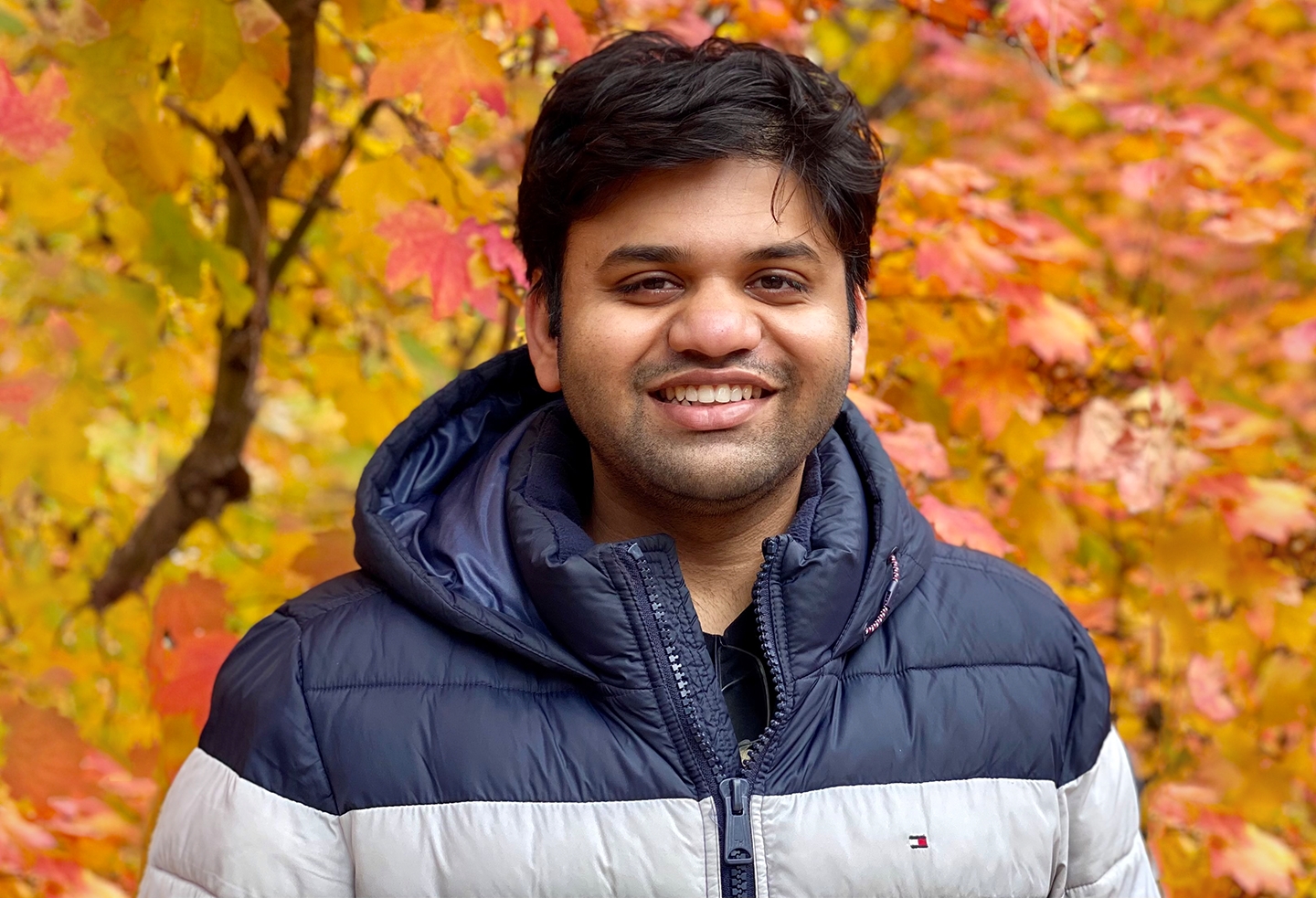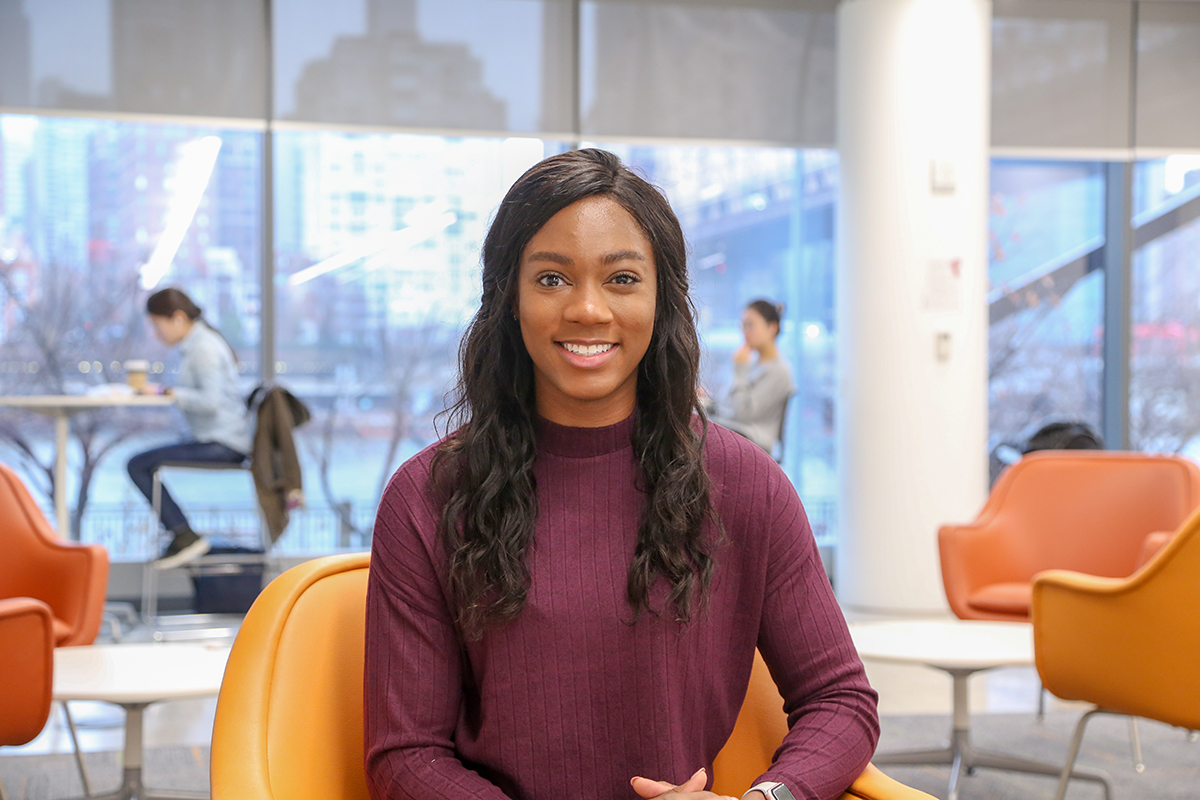

Jacobs Technion-Cornell Dual Master of Science Degrees with a Concentration in Connective Media
Want to learn more?
Request Info
Connective Media at Cornell Tech
Think, Build, Connect


Build Tech for People

Connect IRL

Creating Technology for Humans
Three-Part Curriculum
Technical Courses
Experiment with applied machine learning, computer vision, NLP, blockchain, and more while you build usable connective media applications and systems in rigorous computer science and engineering courses.
Human/Social Courses
Anchor your tech skills with a deeper understanding of behavioral science, psychology, social theory, ethics, and communications studies.
Studio Courses
Practice leadership, product design, startup management and other skills on teams with MBA, law, and engineering students in this required component of all Cornell Tech programs.
About the Jacobs Technion-Cornell Dual Master of Science Degrees with a Concentration in Connective Media
Connective Media is the computer science-centered study of the ecosystems formed when communication, information, and media converge—and the ways in which these ecosystems change how we behave as a society. This technical, dual-degree program educates a new generation of human-centric software engineers, new product developers, and technical user experience specialists to realize the full utility of connective media and constantly innovate new ways to develop and interact with it.
Our project-based, two-year curriculum centers on computer science and engineering and also draws on the disciplines of sociology, psychology, business, entrepreneurship, and design. The program provides exceptional preparation for myriad career paths in academia, industry, and the public sector that require a profound understanding of the human aspects of technology.
Technical Topics
Applied Machine Learning
Augmented Reality & Virtual Reality
Computer Vision
Cryptography, Cybersecurity, and Blockchain
Data Mining & Signal Processing
Human-Centered Design and Interaction Design
Human-Computer Interaction (HCI)
Information and Communication Technologies for Development (ICTD)
Natural Language Processing (NLP)
Physical Computing
Technology, Media & Democracy
Human/Social Topics
Behavioral Research Methods
Communication Ethics, Policy & Law
Human Perception & Cognition
Organizational Science
Psychological and Social Aspects of Tech
Remaking the City: Participatory Design
Revolutionary Tech
Theory of Language
User Motivation & Persuasion
Studio Topics
Challenges of Entrepreneurship
Global Leadership & Multicultural Awareness
Intellectual Property
Law for Non-Lawyers
Leadership for Digital Transformation
Marketing, Sales & Distribution
Product Management
Prototyping & Testing
Solutions Architecture
Startup Funding & Pitching

Connective Media Specialization Project
The two-semester Specialization Project gives you the opportunity to take a deep dive into a topic of your choosing, honing specialized skills, implementing novel prototypes, analyzing complex data sets, or pursuing user-centered design studies.
You will complete the project requirement in one of two ways:
Anchor Course + Self-Directed Project
- Fall: TECH 5901: Intro to Spec — 1 cr
- Spring: Approved-anchor course* (3 cr) and 5920 (1 cr) — 4 cr
- Fall: INFO 5920: Specialization Project** — 4 cr
Faculty-Directed Independent Study
- Fall: TECH 5901: Intro to Spec — 1 cr
- Spring: INFO 7900: Independent Study — 4 cr
- Fall: INFO 7900: Independent Study — 4 cr
* Approved anchor course list available per program
** Projects may be done independently or with partner(s).
Flexibility & Collaboration
No two Connective Media students are alike, except for one thing: a deeply held belief in the value of human-driven thinking for building new technology. You’ll work in a collaborative setting with smart people experimenting with different disciplines and exploring their own potential. Then, you’ll present your work to experts from the larger New York tech community to test their viability. The freedom to study outside your technical area and the “radical collaboration” you’ll experience with students from every other Cornell Tech degree program will help you build strong ties that will serve you throughout your career.
Featured Faculty

Mor Naaman
Associate Dean for Faculty Affairs and Don and Mibs Follett Professor
Mor Naaman is a Professor at the Jacobs Technion-Cornell Institute at Cornell Tech and in the Information Science Department at Cornell University, and currently serves as an Associate Dean for Faculty Affairs (ADFA).
Areas of Research:
AI-mediated communication
Social computing
Computational social science
Trustworthy information ecosystem
Academic Degrees:
Ph.D., Stanford University, 2005
B.A., Tel Aviv University, 1999
Research Labs and Initiatives:
Tech, Media & Democracy
Social Technologies Lab

Nicola Dell
Associate Professor
Nicola Dell is an Associate Professor at the Jacobs Technion-Cornell Institute at Cornell Tech and in the Information Science Department at Cornell University.
Areas of Research:
Human-computer interaction
Computer security and privacy
Computing and social justice
Artificial intelligence
Academic Degrees:
Ph.D., University of Washington, 2015
M.S., University of Washington, 2011
B.Sc., University of East Anglia, 2004
Research Labs and Initiatives:
Clinic to End Tech Abuse
Center for Applied Research on Work
Security, Trust, and Safety Initiative
Digital Life Initiative

Shiri Azenkot
Associate Professor
Areas of Research:
Human-computer interaction
Accessibility
Academic Degrees:
Ph.D., University of Washington, 2014
B.A., Pomona College, 2005
Website: https://shiriazenkot.wixsite.com/shiri-azenkot
Research Labs and Initiatives:
XR Access Research Initiative
Enhancing Ability Lab

Tapan Parikh
Associate Professor
Tapan Parikh is an Associate Professor at Cornell Tech and in the Information Science Department at Cornell University.
Areas of Research:
Human-computer interaction
Academic Degrees:
Ph.D., University of Washington, 2007
Sc.B., Brown University, 1996
Research Labs and Initiatives:
XR Collaboratory
Digital Life Initiative
Q&A ON CONNECTIVE MEDIA WITH PROFESSOR MOR NAAMAN
What does the term Connective Media mean to you?
“To me, Connective Media really suggests a new world order where communication, information, and media collapse or converge into one. Successful connective media platforms—such as iOS, Facebook, Reddit, The New York Times, and Uber—merge social science, information science, computer science, and engineering to change not just the way society uses technology, but the very fabric of society itself. Look at Facebook, for instance: is it a communication tool, is it an information tool, is it media? It is changing the way that we behave as a society: the way we act, the way we get information, the way we diffuse information, the way we shape our views and our culture. Connective media devices, apps, and networked systems are an important and increasingly necessary part of how we work, learn, shop, communicate—even drive. Everything has changed and will continue to change because of this convergence.”
Note: Mor Naaman was founder of Connective Media and its first director.
How is this program different from a human-computer interaction (HCI) program?
“The requirements of the Connective Media program are much more technical than those of HCI programs. You can finish an HCI program without knowing how to program, but to complete this program you must acquire deep technical skills in computer science and engineering. Students can also take advanced technical courses in areas like machine learning, computer vision, and natural language processing that are not available in most HCI programs.”
What makes this program the first of its kind?
“Many new computer science-based programs touch a domain like public health or industrial design or human-computer interaction (HCI), but they don’t go into the technical depth that this programs does. This program gives students a breadth of knowledge in a domain, the social aspect of computing, and also challenges students to go deeper into technology and advanced computer science areas such as applied machine learning, data mining, signal processing, natural language processing (NLP), computer vision, cryptography, cybersecurity, and blockchain, among others.”
What’s an example of how I could apply what I learn in the program?
“Recently, a Connective Media graduate that went to work at Twitter got in touch. He sent me a direct message on Twitter excitedly, saying, ‘Today we used something in our product that we learned in your course.’ I said, ‘What is it?’ He said, ‘It’s the strength of weak ties theory by Granovetter.’ This is dating back to the 1970s when Granovetter first articulated this social theory, which we covered in class. The graduate used the theory for the (very well-known) social media company they work for while developing a machine learning algorithm to rank social content. At the highest levels of technology, it’s not uncommon to encounter sophisticated thinking like this and it gave me satisfaction to know we’re preparing leaders who can think this way.”
What kinds of careers do Connective Media graduates enter?
“We’ve had students go on to take engineering roles, data science, product roles, and even design roles in companies, startups, and others. Our career management services are bar none and will really work hard to help you find a role that matches your interests and talents. Our students end up as interns, then full time employees, in companies like Amazon, Google, Facebook, eBay, Bloomberg, and other companies large and small. The degree definitely opens doors, though you might have to explain a bit what the title means! It can be a conversation starter.”
What can I expect to walk away with when I complete the program?
“Part of what makes this degree more exciting is the project work and teamwork that happens throughout your time here. Every semester essentially, you’ll have one significant project that you’re working on, whether it’s a project for Studio in the first semester or the Specialization Project in semesters two and three or the Startup Studio project in semester four. When these all align, which happens often but not always, you will have a very strong portfolio that allows you to become a real expert in a certain area.”
Career Outcomes
Cornell Tech offers best-in-class career management services to set you up for success after graduation. Recent Connective Media graduates work for companies such as Airbnb, Amazon, Apple, Digg, Google, Facebook, The New York Times, Verizon, and others. Learn about placement rates, student startup ventures, and more.
Diversity & Inclusion
Cornell Tech was founded to advance technology as a means to a better quality of life for all communities in New York City, across the nation, and around the world. Our best work results in ethical, inclusive, accessible technology for all users, especially the underserved and underrepresented. Vital to that mission is building a diverse, equitable, and inclusive community of students, faculty, and staff. We seek to build things with — not just for — real people and believe in the power of participation and representation.
HCI & Social Computing Faculty Research
Particular areas of research of the Human-Computer Interaction (HCI) and Social Computing faculty at Cornell Tech include accessibility, technology in under-resourced communities, computer science education, mobile health, Information and Communication Technologies and Development (ICTD), Computer-supported Cooperative Work (CSCW), and social computing.
Connect to NYC
With its central location in New York City, Cornell Tech students benefit from exceptional access to leaders from the tech sector. Housed within Google’s offices for its first three years, the program also has close ties to Amazon, Verizon, CNN, The New York Times, Facebook, Bloomberg, Qualcomm, and many others. Industry experts mentor specialization projects, provide summer internships, and sometimes even serve on advisory boards of student startups.
Who Should Apply?
The Jacobs Technion-Cornell Dual Master of Science Degrees with a Concentration in Connective Media are open to ambitious students who have a fascination with people-driven technologies and a strong entrepreneurial spirit. While formal academic backgrounds in science or engineering are preferred, they are not required. We will take into account personal or professional experience in mathematics, economics, physical sciences, or other quantitative disciplines. Essentially, your application should demonstrate somehow that you will be able to successfully complete the computer science component of the curriculum, as well as your interest in the human and social aspects of it.
The tech industry has articulated a real need for students with a Connective Media background. They want people who understand not just how to build better systems or write better code but people who also are deeply engaged with how their work will affect the user experience.”

Love Where You Live & Learn
Check out the groundbreaking Cornell Tech campus with a virtual or in-person visit.
Related Stories
